By Claire Bacon, ACN, CNC
If you worry about being prone to bronchitis, flu, or pneumonia over the Winter, now is the perfect time to brush up on ways to take care of your lungs naturally. Strengthen your lungs now, and you’ll have less to worry about later!
Here at our office, we pay a lot of attention to avoiding chemicals that could irritate and weaken lung tissues. For years, we have cleaned the office with only nontoxic products – avoiding the harsh chemicals that aggravate asthma and allergies in susceptible people. And we never use fragranced plug-ins. We diffuse a variety of anti-microbial essential oils in the waiting room – with holiday scents such as Orange, Cinnamon, and Fir Tree blends. Through the Winter, we hope you find our office as inviting as ever!
Knowing that the flu and severe Covid can attack the lungs and cause pneumonia, we are offering some education on our favorite herbs below to support lung health. You may already be familiar with a few, because they are really helpful year-round. Whether your issue tends to be seasonal allergies, chronic bronchitis, or other deep respiratory infections, we hope you’ll gain appreciation for the herbs we discuss below!
Herbal Actions Good for the Lungs
Herbs can work to support the respiratory system via a variety of different mechanisms. These are the primary ways herbs can benefit the respiratory system:
- Analgesics are used to relieve pain. Examples include: Wild Yam, Lobelia, Saligesic (from White Willow), and Skullcap.
- Antibiotics inhibit the growth of bacteria and viruses, such as: Echinacea, Goldenseal (in the Sinus Forte formula), or Thyme.
- Anticatarrhals eliminate the formation of mucus. Examples include: Black Pepper, Mullein and Wild Cherry bark.
- Expectorants – these break up excess mucus in the lung tissues. Licorice, Horehound (in Broncafect), Mullein, Pleurisy root, and Eucalyptus essential oil are all good.
- Respiratory Demulcents – these contain mucilage which has a soothing, anti-inflammatory effect on the lungs. Choose from Slippery elm, Licorice root and Burdock.
- Antitussives – these types of herbs helps to reduce coughing, such as Bupleurum.
- Respiratory Spasmolytics – are herbs that work to relax the muscles in the airways – best for non-productive dry coughs. Raspberry leaves, Valerian and Blue Cohosh.
- Antiallergic – reduces allergic sensitivities, especially with seasonal allergies or hay fever. Stinging nettles, Black Cumin Seed, and Albizia.
Of course there’s nothing wrong with taking one herb to promote your health. But we usually find the best results come from using a blend of herbs that create synergy with overlapping benefits. Don’t let this long list of choices confuse you. We’re here to help with a customized protocol, perfect for what you need!

Herbs for Lung Health
Grindelia
Grindelia (Grindelia camporum) belongs to the same family as sunflowers. Its milky sap has been traditionally used for poison ivy rashes, saddle sores, coughs, colds, and tummy aches. It is used in two of our favorite lung health formulas: ResCo and PulmaCo. Grindelia is recommended for the treatment of spasmodic respiratory conditions such as asthma and bronchitis. It is most commonly used as an expectorant and bronchodilator, and is very helpful in recovery from chronic lung inflammation.

In my opinion, the ResCo blend is best used with an active infection, and PulmaCo is best for daily, chronic inflammation. I have especially noticed PulmaCo works great for exercise-induced chest tightness and breathing issues in the cold!
Thyme
Known for its anti-fungal, anti-viral, and antispasmodic properties, this herb has robust benefits for the entire body. Thyme has been used especially for lung-related illnesses like bronchitis, laryngitis, and coughs. You’ll find this one in Mediherb’s Broncafect formula – either in liquid form or tablets. It’s a powerful remedy for lower respiratory infection. I, personally, have felt it clear gunky lungs and a productive cough very quickly.
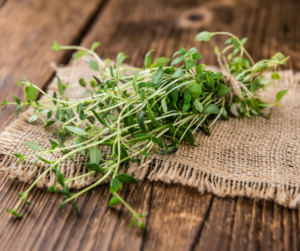
It doesn’t smell very good, but you can also use Thyme essential oil on your chest (diluted of course)! Thyme and Eucalyptus essential oils are two of the most powerful anti-mucus oils you can use!
Baical (Chinese) Skullcap
Baical skullcap (Scutellaria baicalensis) is an important herb in the management of respiratory inflammation. Its actions are:
- Antiallergic,
- Antiviral, and
- Antioxidant.
In addition to reducing mucus membrane inflammation, Skullcap provides relief from spasms, stimulate blood flow in the pelvic region, lessens headaches and fever, and promotes relaxation. It’s a very “zen” herb! It is included in the Nevaton Forte formula for this reason. Additionally, it can help with epilepsy, insomnia, and anxiety.
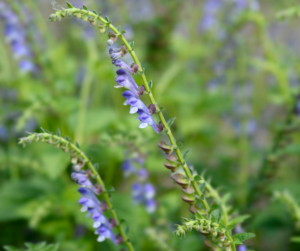
Skullcap is present in the formulas of Albizia Complex and PulmaCo. The various flavonoids present in this herb have anti-allergic and anti-asthmatic activity in several animal models.
Andrographis
When you have an acute infection, Andrographis Complex is THE herbal blend to help you put up a good fight. It helps to regulate body temperature and promote healthy immune cells. Andrographis is generally immune-supportive, and great at resolving bacterial and viral infections in the upper respiratory system. Start taking it at the initial onset of a cold, and watch it knock out infections!
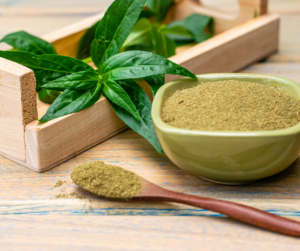
Interestingly, we have noticed that if someone has a hard time with a lingering Covid infection, if they have not yet taken Andrographis Complex, adding it to the daily protocol helps knock it out for good!
Licorice
You may be most familiar with Licorice as a candy. But the herb (Glycyrrhiza glabra) has many beneficial health effects, including being:
- Anti-inflammatory,
- Antitussive,
- Muco-protective,
- Broncho-dilating, and
- an Adrenal tonic.
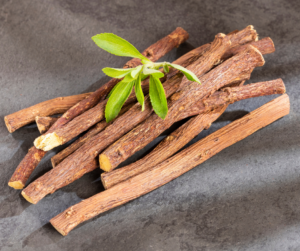
As a versatile herb, Licorice is useful in calming multiple internal tissues, such as those within the gastro-intestinal tract as well as the respiratory system. And, it supports the adrenal glands during stressful times, including when an infection burdens the immune system. We use this herb in Adrenal Complex and in some of our custom herbal blends for many of our protocols! (By the way, Adrenal Complex is only available in office).
Echinacea
Echinacea is probably the most well-known herb to have immune-supporting benefits. Many studies have demonstrated its ability to help resolve bacterial and viral infections. The scientific understanding of how Echinacea works is incomplete, but evidence suggests that Echinacea mainly stimulates phagocytosis, (i.e., acts on the non-specific immune response). Unfortunately, many common Echinacea products contain the wrong plant part, inadequate doses or lack standardization. A surefire way to know you’ve got a potent dose of Echinacea is the tingling feeling on your tongue after tasting it. This is what you will find with Mediherb Echinacea Premium. You may even need to go brush your teeth!
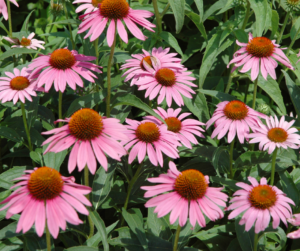
Oregano
Oregano’s antibacterial properties are a safer solution than traditional antibiotics. Of course, oregano contains many phytochemicals that make it such a potent and healing herb. Two of the more prominent phenols are thymol and carvacrol. The PubMed database references over 1,000 studies involving carvacrol and just under 3,000 for thymol. Carvacrol is effective against numerous bacterial infections, whereas thymol boosts your immune system and supports healing.
Our favorite supplement containing Oregano is Biotics ADP. It has been one of our top standbys all through the pandemic, as the active constituents are effective against yeast, mold, fungus, bacteria, viruses, and parasites. No matter what’s causing your sickness, there’s a good chance ADP will fix you up for good! And Gut Flora Complex is another fantastic alternative (available in office)!
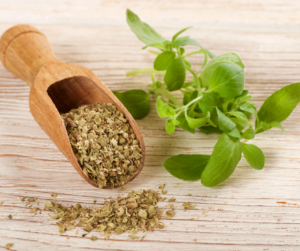
Helpful Anti-Inflammatory Spices
Did you know that you can do a lot of anti-inflammatory good with the herbs you may already have on hand? If you like to cook, and to use your food therapeutically, here are the best beneficial herbs you may already have in your pantry… Ginger, Fennel, Garlic, Thyme, Oregano, and Turmeric. Look for opportunities to use these herbs creatively in your dinner tonight!

Final Thoughts
This blog barely touches on the wide range of herbs that can be great for lung health. There are so many beautiful herbs that can protect and heal your lungs!
We hope this information is a great first step to empower you to relax, de-stress, and take great care of your lungs!
Let us know! We are here to help with any questions you may have.
Like this Article?
If you like this article, check out several more blogs just like it…


